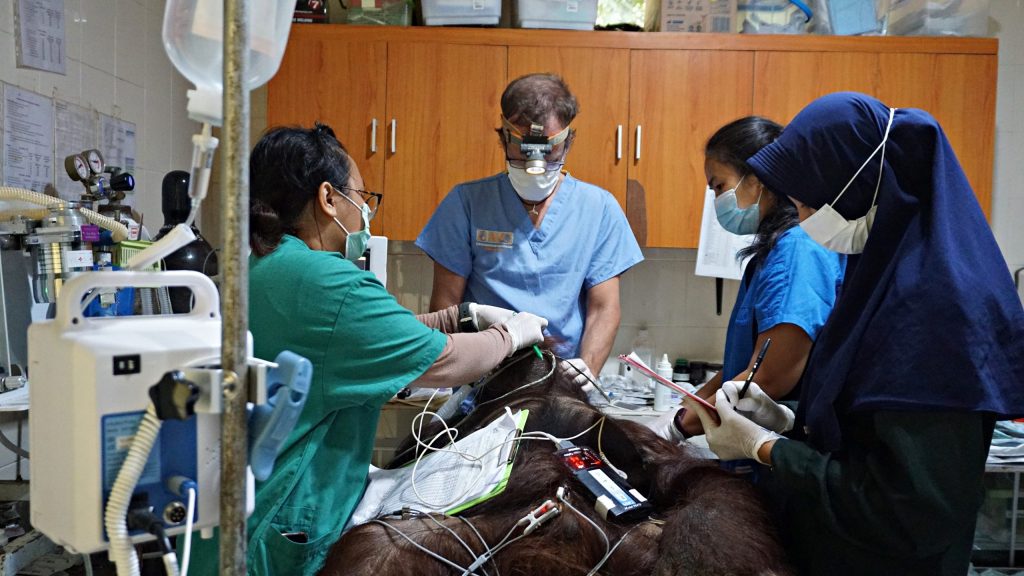Eye Surgery for Jeje
Most of the orangutans that end up at our rehabilitation centres arrive in poor health, with some suffering from severe diseases or disorders that require special care or treatment.
Jeje is one of them. He was handed over to the BOS Foundation when he was about five years old. A wildlife rescue team had confiscated him from a villager who had reportedly kept him from the time he was an infant.
When Jeje arrived at our Samboja Lestari Orangutan Rehabilitation Centre in East Kalimantan in September 2016, we immediately noticed that his left eye did not look normal. Further analysis by the veterinary team determined that Jeje’s eyeball had been previously damaged by a sharp object. This injury could cause severe and long-term problems for the male.
After completing quarantine, we placed Jeje in Forest School Group 1, where we discovered he was considerably slower at picking up new skills than his peers. He was also shy and didn’t socialise much with other orangutans, nor did he appear to enjoy the attention of technicians or surrogate mothers. There were times when he even showed aggression towards our staff. On the other hand, Jeje liked to explore the forest but preferred to do so on the ground.

Learning by doing – our team with Dr Philippa.
In March 2020, we transferred Jeje to Socialisation Cage C after being diagnosed with ORDS (Orangutan Respiratory Disease Syndrome), a unique disorder, usually caused by a bacterial infection. In some cases, ORDS can be fatal. After four months of treatment, we moved Jeje to an individual enclosure alongside several other ORDS-affected orangutans.
While providing care and treatment to Jeje, our veterinary team noted his damaged eye was producing discharge and needed surgical intervention. Unfortunately, the chance of an infection was too high. But lacking experience in ophthalmic surgeries, the team needed to turn to external experts for support.
This is where an ambitious veterinary project came into play. For three months, wildlife veterinarian Dr Joost Philippa stayed at the Samboja Lestari centre to support the sun bear care and veterinary teams.
With the new expertise on board, our veterinarians made the difficult decision to remove Jeje’s left eyeball. Dr Philippa had already carried out this particular procedure at other wildlife conservation projects, so he was able to perform the surgery and at the same time train our vets in how to do it themselves.
Now, two months later, we are happy to report that Jeje’s overall health has improved. He is playing more in his complex than he did before.
The removal of Jeje’s damaged eye was just one of many procedures carried out during this three-month animal welfare training and improvement project.
The BOS Foundation emphasises that this project wouldn’t have been possible without the support of international partners: “We would like to extend our sincerest gratitude to the funding institutions, Orangutan Veterinary Aid (OVAID) and BOS Switzerland. We thank them for their assistance as well as the other BOS Partners BOS Australia, BOS Germany, BOS UK, BOS-USA and Save the Orangutan, who financially and logistically support the daily work of our Samboja Lestari Orangutan Rehabilitation Centre. And last but certainly not least, thank you, Dr Joost, for providing us with your expertise.”
Keep getting better, Jeje!





